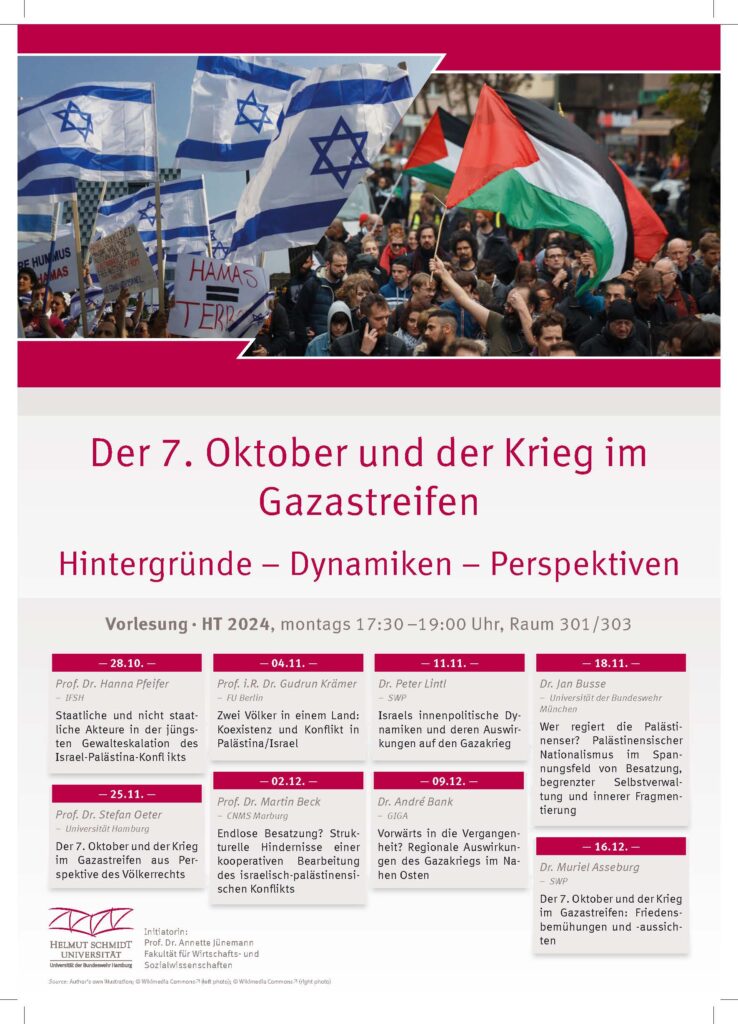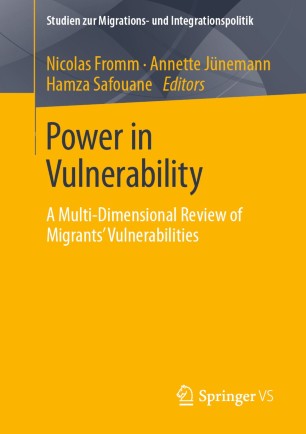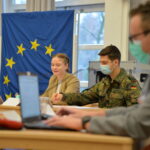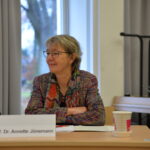
The research interests of Prof. Dr. Annette Jünemann and her team are in the field of international relations, especially EU external relations, with a regional focus on the Mediterranean region (EuroMed), the Middle East, and North Africa. Specifically, we are interested in transformation and democratization processes, also from the perspective of gender studies. We are currently working on the topic of both migration and forced migration. To find more about our research, please refer to the sections Research, Team, and Teaching.
Consultation Hours:
In FT2025, consultation hours take place individually by arrangement. Please contact Prof. Jünemann, Ms. Göttsche and Mr. Gedikli directly by email.
News:
Past events:
Lecture series on the Middle East conflict in HT 24 at the HSU:

Visit of the Ukrainian Ambassador Oleksii Makeiev on April 28, 2023 at HSU
You can find the report here
New publications:
Gedikli, Ardahan / Jünemann, Annette (2024): Deutschland und die europäische Mittelmeerpolitik. In: Böttger, Katrin / Jopp, Mathias (Hrsg.): Handbuch zur Deutschen Europapolitik. Baden-Baden, zweite Auflage. Nomos (im erscheinen)
Jünemann, Annette (2023)„Die Zivilgesellschaft der Europäischen Union im Politikfeld Asyl und
Migration: Hoffnungsträger mit begrenztem Handlungsspielraum. In: Gieg, Philipp / Lowinger, Timo / Pietzko, Manuel / Rüger, Carolin / Scheuermann, Manuela / Zürn, Anja (Hrsg.): Jenseits der Krisen: Potenziale der europäischen Integration im 21. Jahrhundert, Wiesbaden: SpringerVS. S. 253-284, Link to pdf here
Link to Springer here
The Anthology “Power in Vulnerability. A Multi-Dimensional Review of Migrants’ Vulnerabilities” has been published.
The anthology “Power in Vulnerability. A Multi-Dimensional Review of Migrants’ Vulnerabilities” has been edited and authored by members of our department in collaboration with several other researchers.
With this volume, the editors propose a multi-dimensional and critical review of migrants’ vulnerabilities. They argue that a deeper understanding of vulnerability is paramount to discussing empowerment and resilience. Regardless of their motivations, migrants can face vulnerabilities at any of the stages of their journey. These vulnerabilities may change over time for better or worse, corresponding with a person’s legal status, migratory path, and the practices of migration regulation. This book addresses vulnerability from an interdisciplinary and intersectional perspective. It brings together the latest academic research and practitioners’ insights to help reception societies adapt and improve their dealing with migrants’ vulnerabilities.
The volume includes articles by Prof. Dr. Jünemann, Dr. Fromm, Dr. Safouane, Sandra Göttsche, and Yaiza Rojas Matas, from the Department of International Relations at the HSU.
More information in the following link: https://www.springer.com/de/book/9783658340513#aboutAuthors

Teaching news:
- Simulation game “Via Pontica – Bridge over Troubled Waters”: EU Crisis Management Exercise:
Is there a solution to the distribution dilemma of refugees in the EU? That question was given out to a group of undergrads, consisting out of civilian and military students, at Helmut-Schmidt University. In order to simulate a realistic EU Council meeting (25th-26th of November 2021), students got together in pairs, to play a given country at that exact meeting. Their scenario was a refugee crisis along the shores of the Romanian Black-Sea coast. In doing so, students were able to get an impression of what it takes to come up with a solution to a given problem, on which every country can agree upon.
Navigating through what seemed a “jungle of different interests”, the EU Council president of Slovenia put in a lot of effort, to keep every member state in the discussion and to give out a fair share of talking time to each state. In the end, the EU Council found a way to deploy European police forces and humanitarian aid. Nevertheless, a general solution for the current migration situation and its distribution component could not be found. Afterwards, students acknowledged how hard it can be, to satisfy each member state. Still, students appreciated the simulation game very much, their only request for another simulation game: more time. That being said, it was a pleasant and valuable experience for students, as well as for the teaching staff.
- Participants in the simulation game 2021

